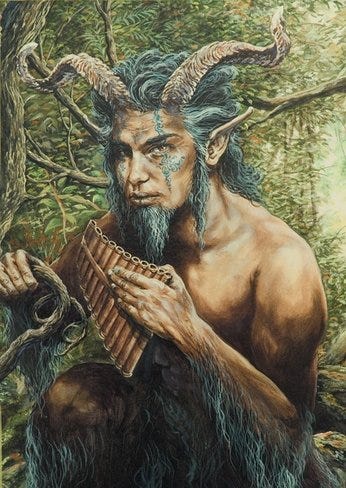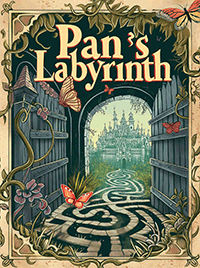The Great God PAN

The most elusive of all the gods is a half-human, half-goat deity known as ‘Pan’. A nature god, Pan is usually depicted with the legs of a goat, horns and carrying a pan-pipe. Pan is mostly forgotten in our modern world, a footnote in history, lacking the rich mythology enjoyed by most of the old gods. And yet, Pan is pervasive in the collective unconscious. He pops up in all sorts of unexpected places.
Here he is as Peter Pan:

And here as Mr Tumnus in The Lion, The Witch and the Wardrobe:

And here as the Pied Piper of Hamelin (also known as the Pan Piper of Hamelin):

The connection to the Pied Piper may seem a little more far-fetched until you recognize the theme. In all three of these stories the Pan character leads children into a magical world. Peter Pan collects ‘lost boys’ and brings them to the magical Neverland. Tumnus meets Lucy as soon as she enters Narnia, convinces her to go home with him, then enchants her with his pan-pipe. The Pied Piper also leads the children of Hamelin away into a magical world by playing his pipe.
The theme of seducing children has not gone unnoticed and all three of these stories have been accused of being metaphors for pedophilia. Acknowledging that, and not disregarding that both J. M. Barrie and C. S. Lewis may well have been using it as a pedophile metaphor (both being questionable characters) I do not believe that the pedophile metaphor is the correct interpretation — and yet the theme of seducing children away to a magical world is pervasive. What does it mean, and how does this connect to the Greek god known as Pan? I will come back to this later, after taking a quick detour.
Etymology
The word ‘pan’ is Greek for ‘all’, as in all-encompassing, an affix that survives today in words such as ‘panacea’ and ‘pandemic’. While some scholars have suggested that the word ‘pan’ may be related to the Greek for ‘pasture’ or ‘companion’, this is merely conjecture. The surface-level meaning of ‘pan’ being ‘all’ fits the narrative and I believe is a clue to the true identity of the god known as Pan.
Mythology
The remaining myths of Pan paint him as a sort of happy-go-lucky character, frolicking through the forests having sex with nymphs (tree spirits), singing and dancing. What’s more telling is what Pan doesn’t do. He doesn’t really do anything. Pan doesn’t engage in power-struggles. Doesn’t fight the other gods. He’s not really in charge of anything, and he lives down on Earth, not up on top of Mount Olympus with the other gods. Pan acts more or less like the half-man and half-animal that he is: minding his own business and just doing what he does.
Notably Pan doesn’t fight, yet if threatened he lets out a scream so fearful that it induces panic (the origin of the word) in all who hear it. I think it worth noting that many animals roar to scare away those they consider a threat, or to express their displeasure.
Myths and religions from a particular period tend to adopt the astrological symbol from that time, which is useful for dating them. Christianity, for example, uses the fish symbol because its from the age of Pisces (1–2000 AD). Jason and the Golden Fleece from Aries (2000 BC–1 AD). The myth of Theseus and the Minotaur originates from the time of Taurus (4000–2000 BC). Pan has goat’s legs and horns, meaning its using Capricorn symbolism. That makes it one of the oldest myths, dating from 20,000 BC. In fact, it’s right at the beginning of the current Platonic Year, as we’ve just moved into Aquarius, and Capricorn follows that in the precession of the equinoxes.
Pan then is perhaps as old as the oldest god, and indeed may well be the same god as they share a resemblance. I’m of course talking of the Green Man, the personification of nature and the oldest religious symbol known:

The Death of Pan
“The great god Pan is dead!”
The mythology of Pan ties directly into the rise of Christianity. From Wikipedia:
According to the Greek historian Plutarch (in De defectu oraculorum, “The Obsolescence of Oracles”),[34] Pan is the only Greek god (other than Asclepius) who actually dies. During the reign of Tiberius (14–37 CE), the news of Pan’s death came to one Thamus, a sailor on his way to Italy by way of the island of Paxi. A divine voice hailed him across the salt water, “Thamus, are you there? When you reach Palodes,[35] take care to proclaim that the great god Pan is dead.” Which Thamus did, and the news was greeted from shore with groans and laments.
Christian apologists such as G. K. Chesterton have repeated and amplified the significance of the “death” of Pan, suggesting that with the “death” of Pan came the advent of theology. To this effect, Chesterton once said, “It is said truly in a sense that Pan died because Christ was born. It is almost as true in another sense that men knew that Christ was born because Pan was already dead. A void was made by the vanishing world of the whole mythology of mankind, which would have asphyxiated like a vacuum if it had not been filled with theology.”[36][37][38] It was interpreted with concurrent meanings in all four modes of medieval exegesis: literally as historical fact, and allegorically as the death of the ancient order at the coming of the new. Eusebius of Caesarea in his Praeparatio
The most telling sentence here is “men knew that Christ was born because Pan was already dead”. Or to put it another way: Christianity killed Pan. They could not both exist, one had to die for the other to be born. What do I mean when I say Christianity killed Pan? And what does Pan have to do with Christianity?
For an apparent mid-level god of no obvious importance, who doesn’t really do anything, Pan has taken the full force of the wrath of Christianity. It is no accident that the imagery of the Devil is a man with horns and the legs of a goat. The image of the Devil is the image of Pan! There is no description in The Bible of this image of the Devil, and yet over 2,000 years the people of the world have been conditioned into associating the very image of Pan with the image of the Devil without Pan’s name ever being mentioned.


The fact that there is so little mythology, so few stories about Pan is in itself suspicious for a god whom is so pervasive in the collective unconscious and whom the Church is so hell-bent on slandering. Yet they dare not speak his name. Did the Church destroy the mythology of Pan?
Why Kill Pan?
Pan is a nature god, Pan is part of nature — a personification of the spirit of nature, if you will. What you have here is a direct attack of man against nature. The death of Pan at the hands of Christianity symbolizes the point at which the spirit of man overpowered the spirit of nature. Man killed God (Nietzsche: “God is dead”), and in the place of God man put himself. Nature itself was then demonized and man was taught to suppress their natural instincts, to follow the law of man above all else. Sex, the very expression of new life and generation, was twisted upside-down and inside-out to become a sin. A new order emerged, one in which man now ruled the Earth. Technology became the new god, and love of self the new mantra. Man now saw himself as the creator, no longer an animal, no longer part of nature, but above it and able to bend it to his will.
Who is Pan?
All gods except Pan were, just as human are now, engaged in a never-ending power-struggle. Pan alone doesn’t play this game. This is Pan’s secret. Just the clues of the name ‘Pan’ meaning ‘all’ combined with the actions, or rather inactions, of Pan is enough to shine light on Pan’s true identity.
As long as you are climbing a ladder, you are always playing the game of the ladder-maker. In any organization, one can only ever achieve position #2 by trying. The highest position you can rise to in a company is CEO, but what is a CEO if not just a glorified manager? Who does the CEO work for? They work for the owner of the company, the founder.
Pan, the god of nature, is the only god that doesn’t do anything. Why? Because Pan is the founder, the creator. Zeus, the king of the gods has to maintain his position as king, and he has responsibilities. He has a job to do. He’s playing someone else’s game… Pan’s game.
And it makes sense. Pan is all. Pan is everything. Pan is the one true god. Pan created the ‘game’ we are in, the Matrix, this reality. It is Pan’s Labyrinth.

And Pan, the story-writer, the author of this world, doesn’t play the game, but is the gamemaster. The gamemaster, in any role-playing game, is the one character who doesn’t themselves play. Yet authors have a tendency to write themselves into their stories, and Pan is no exception. Pan wrote himself into the story, gave himself a character who does nothing but play so he himself could walk within his own creation. Everyone else is busy working, and Pan enjoys the show.
And that is the meaning of the pervasive story of Pan’s leading of lost children into a magical world. We are the lost children, Pan is the pied piper, and this is the magical world. This is Pan’s Labyrinth.
So when Nietzsche announced that “God is dead” you know which god it is, the only god that ever died: Pan. Pan was killed by the son of man so that man could play at god for a time, and to do this everything was inverted: man become god and the true god became the Devil.
But Pan was never truly dead, only sleeping, and he is stirring.
The great god Pan lives.

If you enjoyed this article, you’d like my book “Pan’s Labyrinth”.
Pan’s Labyrinth deftly blends fantasy and philosophy, crafting a thought-provoking narrative that lingers in the mind long after the final page is turned. It invites readers to question the nature of reality and explore the profound ideas woven throughout the story. Engaging and intellectually stimulating, this book promises a reading experience that is both entertaining and deeply meaningful.
